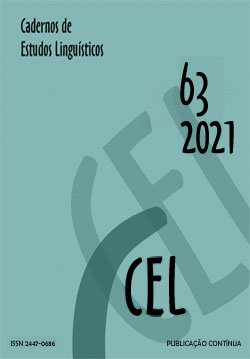Abstract
In this article, we take mourning as discourse, configured as effect of meaning produced in and by the functioning of language. In doing so, we question how the meaning of mourning moves, gains directions by materializing relations with other meaning(s), which makes the meaning of mourning visible as non-one, as a point of possible discursive articulations – sustaining relations in and of the discursive thread – and discursive latitudes – distending-(re)arranging relations in and of the discursive thread. It is through these articulations and latitudes that the non-one meaning of mourning is constituted as a metaphor and, in this way, it structures and is structured by the production of discursivities that signify different social formations in different directions. In order to read how the mourning metaphor produces drifts, we methodologically expose it to others, such as that of the mirror – "an image that is disturbed/an image that disturbs" – and that of suffocation – "it is not possible to breathe". We understand, therefore, how the non-one meaning of mourning works by invoking relations that historicize different ways of "being in mourning", that is, different ways of (re)producing the movement of presence-absence in and through language that determine certain movements of symbolic identification in and for the subject.
References
ALTHUSSER, L. Ideologia e aparelhos ideológicos do Estado. Trad. Port. Lisboa: Editorial Presença, 1970.
ASSIS, J. M. Machado de. O Espelho - esboço de uma nova teoria sobre a alma humana. In: ASSIS, J. M. Machado de. Obra Completa, v. II [Conto e Teatro, Papéis Avulsos]. Org. de Afrânio Coutinho. Rio de Janeiro: Editora Nova Aguilar, 1979. p. 345-352.
BASHÔ, M. 39 Haikais de Bashô. Trad. Bras. Edição Independente, Amazon, E-book, 2020.
BOBBIO, N.; MATTEUCCI, N; PASQUINO, G. Dicionário de Política. Trad Bras. 11. ed. Brasília: Editora Universidade de Brasília, 1998. 2 vols.
CHEMAMA, R. Dicionário de psicanálise. Trad Bras. Porto Alegre: Artes Médicas Sul, 1995.
DAVALLON, J. Imagem, uma arte de memória? In: PÊCHEUX, M. et al. Papel da memória. Trad. Bras. Campinas: Pontes, 1999 [1983]. p. 23-37.
ESTADOS e municípios temem falta de oxigênio e alertam Ministério da Saúde. O Globo [online], Rio de Janeiro, 18 março 2021. Disponível em: https://oglobo.globo.com/sociedade/coronavirus/estados-municipios-temem-falta-de-oxigenio-alertam-ministerio-da-saude-24929488. Acesso em 05/04/2021.
FALTA oxigênio em Manaus: 4 pontos para entender o caos na capital do Amazonas. Gazeta do Povo [online], Curitiba, 15 março 2021. Disponível em: https://www.gazetadopovo.com.br/republica/coronavirus-manaus-colapso-falta-oxigenio/. Acesso em 05/04/2021.
FOUCAULT, M. Capítulo I. Las meniñas. In: FOUCAULT, M. As palavras e as coisas: uma arqueologia das ciências humanas. Trad. Bras. 8. ed. São Paulo: Martins Fontes, 1999 [1966].
FREUD, S. Além do princípio do prazer. In: FREUD, S. Obras completas (1917-1920), vol. 14 [Versão e-book]. São Paulo: Companhia das Letras, 2010.
HAROCHE, C; PÊCHEUX, M.; HENRY, P. A semântica e o corte saussuriano: língua, linguagem, discurso. In: BARONAS, R. L. (Org.) Análise do Discurso: apontamentos para uma história da noção-conceito de formação discursiva. 2. ed. rev. e ampl. São Carlos: Pedro & João, 2011 [1971]. p. 13-32.
LACAN, J. Séminaire 20 - Encore (1972-73). Versão online disponível em: http://staferla.free.fr/S20/S20%20ENCORE.pdf. Acesso em 29/07/2021.
MARIANI, B. S. C. Escrevendo perda e luto em Esaú e Jacó. In: TFOUNI, L. V. Letramento, escrita e leitura: questões contemporâneas. Campinas: Mercado de Letras, 2010. p. 33-42.
ORLANDI, E.P. A análise de discurso e seus entre-meios: notas a sua história no Brasil. Cadernos de Estudos Linguísticos, Campinas, n. 42, p. 21-40, jan./jun. 2002. Disponível em: https://core.ac.uk/download/pdf/296609823.pdf. Acesso em 05/04/2021.
PAZ, O. A poesia de Matsúo Bashô. In: PAZ, O. Signos em rotação. Trad. Bras. 3. ed. São Paulo: Perspectiva, 1996 [1954]. p. 155-167.
PÊCHEUX, M. Semântica e discurso: uma crítica à afirmação do óbvio. Trad. Bras. 2. ed. Campinas: Editora da Unicamp, 1995 [1975].
PÊCHEUX, M. Papel da memória. In: PÊCHEUX, M. et al. Papel da memória. Trad. Bras. Campinas: Pontes, 1999 [1983]. p. 49-57.
PÊCHEUX, M. O discurso: estrutura ou acontecimento. 2. ed. Campinas: Pontes, 1997 [1983].
ROSA, J. G. O Espelho. In: ROSA, J. G. Primeiras Histórias. Rio de Janeiro: Editora Nova Fronteira, 2001 [1962].
ROUDINESCO, E.; PLON, M. Dicionário de psicanálise. Rio de Janeiro: Zahar, 1998.
SERENI, E. De Marx a Lênin: a categoria de "formação econômico-social". Meridiano [Revista de Geografía], Buenos Aires, Centro de Estudios Alexander von Humboldt, n. 2, p. 297-346, 2013. Disponível em: http://www.revistameridiano.org/n2/17/. Acesso em 22/02/2021.

This work is licensed under a Creative Commons Attribution-NonCommercial 4.0 International License.
Copyright (c) 2021 Cadernos de Estudos Linguísticos


